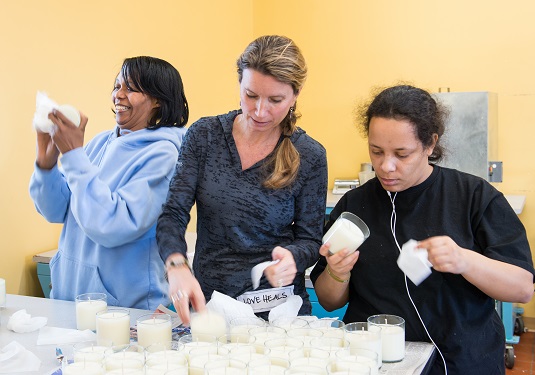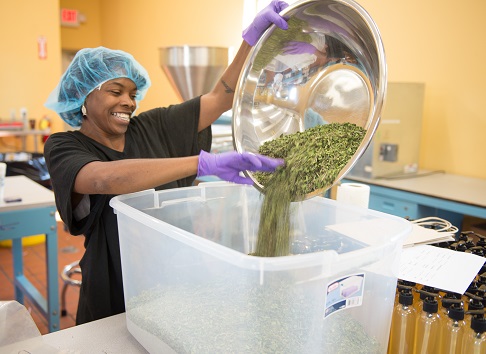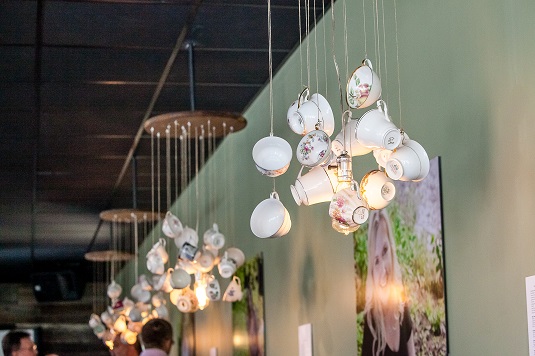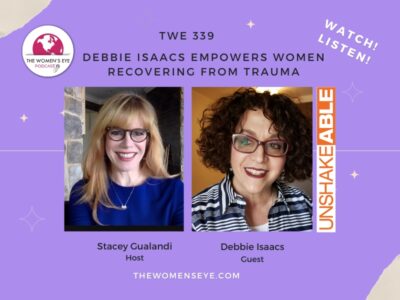
UPDATE 6/3/16—Becca Stevens CNN Hero: Unique Program Helps Women Escape Streets, Transforms Lives
By Patricia Caso/March 23, 2015
TWITTER: @RevBeccaStevens
Having always enjoyed a cup of tea at any time of day, I never thought of it as an agent for women’s transformation. Reverend Becca Stevens has, locally and globally. Her Thistle Farms, a multifaceted enterprise to rescue women survivors of prostitution, drugs and trafficking, and Becca’s Tea Café have led to a worldwide movement to emancipate women from the streets. Her motto: “Love Heals.”
“I’m part of a group of women who are not afraid to speak their truths, that are not afraid to test their ideals out in the marketplace, and that believe that we have a rightful place in leading movements.” Rev. Becca Stevens
Catching up with Becca in Nashville, Tennessee by phone, I got a glimpse into the hows and whys of her dynamic social vision, including how she built a million-dollar-plus company.
She depicts her fascinating journey in her book, The Way of Tea and Justice: Rescuing the World’s Favorite Beverage from its Violent History…
EYE: Growing an active community as an Episcopalian university chaplain continues to be a full-time job. When did you decide you could also help women living in the shadows?
 BECCA: I had the idea of starting Thistle Farms Residential-Magdalene for survivors of prostitution, drug addiction and trafficking even before I took the Chaplain’s job at Vanderbilt in 1997. The ministries grew together, becoming a thriving community endeavor on both sides.
BECCA: I had the idea of starting Thistle Farms Residential-Magdalene for survivors of prostitution, drug addiction and trafficking even before I took the Chaplain’s job at Vanderbilt in 1997. The ministries grew together, becoming a thriving community endeavor on both sides.
That led to the social enterprise component in 2001, Thistle Farms, which gives these women jobs making healing bath and body products.
Our graduates, now numbering 150, need the tools for economic independence to ultimately succeed. Today, Thistle Farm products are available in over 400 stores in the U.S.
The Thistle Stop Café materialized in 2013 because we were feeding as many as 1,000 people annually who were coming to learn about the whole Thistle Farms model and even volunteer.
The Café is founded on 4 principles: (1) Chado, the way of tea, which is about simplicity and beauty and intention. (2) Stories. (3) Hospitality, the guest is the most honored person in the room. (4) Healing.
EYE: How are these women transformed in your programs?
BECCA: There is no cookie-cutter profile or transformation among survivors. I don’t think our bodies, minds and heart heal at the same time. I see the commonality of people falling in love, that they understand they are valuable, smart and beautiful.
A wonderful survivor, who now works in our shipping department, had been raised in seven different foster homes and molested in every single one of them. Our program gives broken and lost people like her a place to heal, the confidence to have a voice and stronger opinions. As a consequence, they are more grateful.
EYE: What do you relate to with the women you work with?
BECCA: I have a history of sexual abuse as a child. The women I serve with at Magdalene on average were raped between the ages of 7 and 11. There’s this history of childhood vulnerability and survival, although I do not ever compare my story with the women I serve because I had a lot of other safety nets that helped me pull through.
I share a common, deep desire that we believe we are healed. I also share the longing to see this world transformed.

EYE: Why is thistle the umbrella name for your residential group, business and café?
BECCA: Thistle is the only plant or weed, depending on your perspective, that still lives where the women walked, slept. It signifies the hell of life on the streets. However, it also has a beautiful purple center and we say that even Solomon in all his glory is not arrayed like one of these!
“It reminds us all that despite all our prickly exteriors, there is a soft beautiful center; that we are all a part of the beauty of creation, even the thistles of this world.”
Thistles are definitely resilient; they are survivors. Look how they grow through concrete, even survive drought. Thistles are also very healing, good for your liver and can balance the body after trauma. We make paper out of thistle and our thistle blended teas happen to be our most popular item at the Café.
EYE: Any worries about the women when they leave your program?
BECCA: The women call themselves sisters for life. While they might leave the residence, they never leave the community. However, I worry most about their intimate relationships and that they don’t get taken advantage of. One of the truths is that they will relapse over a relationship before they relapse over drugs.

EYE: What triggered your look into the history and current practices involving tea pickers?
BECCA: As Thistle Stop Café was becoming real, I was looking into the healing properties of tea. Part of the quality of anything that we consume is the way it is grown and treated.
It took about 10 minutes to find out in an internet search that the injustices around tea picking and production are global. People constantly send me articles like one about the tea estates in Sierra Leone where there are still so many injustices for the workers.
EYE: What connection do you see between the tea trade and Thistle’s women?
BECCA: Bonds of poverty. That systemic and desperate poverty diminishes the value of women dramatically and it oppresses women in a particular way, whether it makes them more vulnerable to domestic violence, susceptible to traffickers, to runaways, or it literally doesn’t allow them to parent well.
“The idea of seeing social justice as joining together to increase our economic leverage means women can literally build freedom locally.”
One of our new social enterprises around tea is a group of women who are desperately poor in Mexico. We buy the healing moringa tea leaves that they grow and harvest. For some, this is their very first paycheck. Others are coming off the streets with a solid job for the first time in their lives.
EYE: How were you the turning point for them?
BECCA: All they needed was a way to organize and a way to show their gifts as entrepreneurs and farmers. Once you are poor and on the street you are basically an entrepreneur anyway trying to figure out how to make a life. One of the women was able to find an apartment. Another was finally able to pay for her children’s education.
A Kenyan woman said this was the first time she wasn’t beaten because she wasn’t begging for money for food. Economic independence is huge for women globally.
I Am a Thistle Farmer–Becca Stevens 6/13/11
BECCA: It is specifically focused on social enterprises where women are the mission of the organization. It’s a very narrow interpretation of Fair Trade. In addition we are going beyond market price and offering better percentages for the groups that we are partnering with worldwide. Shared Trade is a global movement.
We work with tea and about 13 other products from jewelry makers in India, scarf makers in Cambodia, basket makers in Rwanda and more. We are active in 15 countries. At least a thousand women are off the streets and employed as a result of this global cooperative.
EYE: Would you explain your saying, “Blissful ignorance is the only way to get projects off the ground.”
BECCA: To me, the beauty of when an idea arises in our hearts is that it is compelling. All the details and the actual hard work of it, none of that comes with the initial thought.
“The initial thought, which is what we call inspiration, feels pretty simple. It calls us to action. The obstacles and details and costly nature come later.”
EYE: In addition to fundraising, you’ve been asking people for teacups?
BECCA: The people who were coming in to our café had a story; people serving the tea had a story. All of us honor story as critical to healing of the community. So it made sense to get teacups as a symbol of that story we are bringing.
We are amazed with all the people globally who continue to respond with stories and teacups honoring women survivors. It is so beautiful. Some are used for decorations, like our chandeliers, and others are used for serving.

EYE: Looking over the years from 1997 to now, what do you see has happened to Thistle Farms?
BECCA: The community at Thistle Farms is an amazing miracle. We have struggles, our tender moments, hilarious moments and a strong loving place. When we started, I thought, “Isn’t it amazing that it takes a whole community to help five women.”
Now, I look back and see how those five women have transformed a whole community. Furthermore, I hope people can see a bunch of women, who didn’t have much history in business, have a multimillion-dollar company going.
“We are just beginning to tap into how much we can do. I also had no idea how many people would hope with us. I completely underestimated that.”
EYE: What do you want women to see who look to you as a role model?
BECCA: I want them to see me as part of a strong community. I’m part of a group of women who are not afraid to speak their truths; that are not afraid to test their ideals out in the marketplace; and who believe that we have a rightful place in leading movements.

EYE: With all the interactions you have, what issues should women be concerned with?
BECCA: Most interesting to me now is community-based justice, not issues-based justice. Women are usually at the heart of that. Women must be at the heart of all this work of not leaving anyone behind, so that our entire community can heal and thrive.
EYE: Your determined outreach on behalf of women who are challenged at the most basic levels is an inspiration. Continued success and thank you, Reverend Stevens, for your time and your insights!
###



Thank you for this great interview with Rev. Becca Stevens and for all the great information about Magdalene and Thistle Farms. Through my fairly new initiative, Magdalene’s Child (website still lovingly under construction), I am supporting Thistle Farms and the women of the Magdalene community. Through my healing practice, and collaborating with various artists, musicians, yogis, and other healers, my mission is to empower the invisible children of the world. This mission includes helping the women of Magdalene and others who have survived lives of sexual exploitation and trafficking. I am proud to be a Thistle Farmer. I love what Becca had to say about unconditional love…you love in the most radical way – without judgment. My hope is that many women and people around the globe will hear and answer this call to love unconditionally and to take action against the injustices women of the world are facing today.